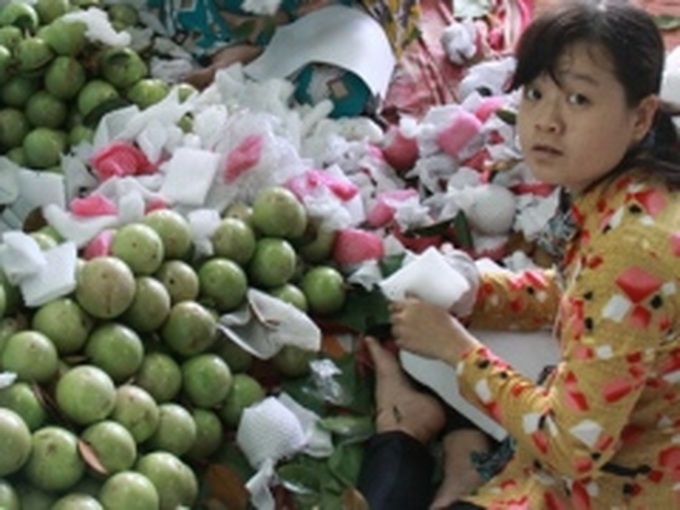While local authorities and scientists have extended efforts to encourage more farmers to cultivate in line with the GlobalGAP or VietGAP standards, those following them have demanded a return to traditional practices.
 |
| Though growing the star apples under the GlobalGAP standards, farmers still have to sell them at prices of normal fruit -Photo: Tuoi Tre |
The Tien Giang-based Lo Ren Vinh Kim cooperative was one of the first specializing areas in the Mekong Delta to be awarded the GlobalGAP certification in 2008.
While local farmers were at first happy and proud of being ‘GAP farmers’, they are now considerably disappointed, as the products are sold at prices as low as those cultivated using the normal agricultural practices, despite their hard work on the orchards.
In 2008 Nguyen Ngoc Dieu of Chau Thanh District pioneered to join the Lo Ren Vinh Kim cooperative, to have his 3,000-square-meter star apple orchard grown under GlobalGAP standards.
“It is said that fruits cultivated in line with GAP can be exported easily, and at high prices, so I followed the trend without hesitation, though I did know that it is not easy to follow the practice,” said Dieu.
“Yet the GlobalGAP star apples are now sold in the markets at prices equal to normal ones.”
Dieu had spent a year of extensive hard work to meet the 243 standards provided by GlobalGAP, only to see traders buying his fruits at usual prices.
Consequently, the farmer stopped following the global practices, and went back to his traditional agricultural method in 2009.
“For over the last three years, I no longer have to work as arduously to meet the good practice standards, but am still able to sell the fruits at reasonable prices,” he said.
Similarly, Vo Tan Hung, Dieu’s neighbor, also withdrew from the GlobalGAP model just one year after tending his 4,000-square-meter apple star garden under its standards.
“When my star apples were grown under the GlobalGAP standards, Lo Ren Vinh Kim cooperative only agreed to buy the good fruit, which was only 30 percent of the total production,” said Hung.
“We had to sell the remaining 70 percent to traders at dirt cheap prices.”
Meanwhile in Vinh Long Province, farmers of the Nam Roi My Hoa grapefruit cooperative have also been turning their backs on the GlobalGAP standards.
With only 30 percent of the GlobalGAP grapefruits sold at prices slightly higher than market rates, 23 out of 26 members of the cooperative have gotten rid of the GAP to return to their traditional methods.
The exporters only bought fruits that were large and good-looking, farmers said.
Moreover, the cooperative did not buy all of the members’ products, so they had to bring the fruits to sell in the markets, they added.
Back in 2009, when the cooperative was awarded the GlobalGAP certification, around 600 tonnes of grapefruits were qualified to be shipped to the US and some European countries.
However, the figures steadily slumped, reaching only 36 tonnes last year, and to date, only 15 tonnes.
No money, no GAP
Nguyen Van Nghia, head of the My Hoa cooperative, said since the GlobalGAP certification of his cooperative expired in September 2010, he is seeking funding assistance to renew the certification.
The renewal fee is around USD7,000, he said.
Meanwhile, according to Doctor Nguyen Hong Thuy from the Tien Giang Department of Science and Technology, a GlobalGAP certification will cost farmers USD3,200, while the fee for VietGAP is VND40 million (USD2,000) per 20 hectares.
Over the last few years, most of the fruit growing areas in the Mekong Delta were granted the GlobalGAP certification thanks to sponsorship from businesses or local authorities, in a bid to attract farmers.
However, since the GAP certification is only valid for one year, farmers have to reach into their own pockets should they want to renew it for the following years.
Doctor Thuy said the renewal fee is equal to the granting fee.
“Consequently, many farmers have stopped following the GAP since they cannot afford the renewal,” he said.
